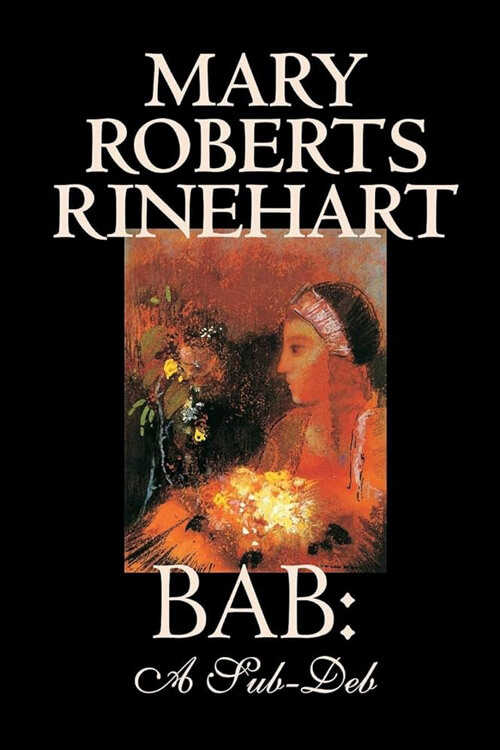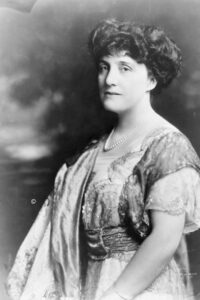
Bab: A Sub-Deb
I shall go back, for a short time, to the way things were at home when I was small. I was very strictly raised. Except for Tommy Gray, who lives next door and is only about my age, I was never permitted to know any of the Other Sex.
Looking back, I am sure that the present way society is organized is really to blame for everything. I am being frank, and that is the way I feel. I was too strictly raised. I always had a governess tagging along. Until I came here to school I had never walked to the corner of the next street unattended. If it wasn’t Mademoiselle, it was Mother’s maid, and if it wasn’t either of them, it was Mother herself, telling me to hold my toes out and my shoulder blades in. As I have said, I never knew any of the Other Sex, except the miserable little beasts at dancing school. I used to make faces at them when Mademoiselle was putting on my slippers and pulling out my hair bow. They were uninteresting, and I used to put pins in my sash so that they would get scratched.
Their pumps mostly squeaked, and nobody noticed it, although I have known my parents to dismiss a Butler who creaked at the table.
When I was sent away to school, I expected to learn something about life. But I was disappointed. I do not desire to criticize this institution of learning. It is an excellent one, as is shown by the fact that the best families send their daughters here. But to learn life one must know something of both sides of it, male and female. It was, therefore, a matter of deep regret to me to find that, except for the dancing master, who has three children, and the gardener, there were no members of the sterner sex to be seen.
The athletic coach was a girl! As she has left now to be married, I venture to say that she was not what Lord Chesterfield so euphoniously termed “SUAVITER IN MODO, FORTATER IN RE.”
When we go out to walk we are taken to the country, and the three matinees a year we see in the city are mostly Shakespeare, arranged for the young. We are allowed only certain magazines, the Atlantic Monthly and one or two others, and Barbara Armstrong was penalized for having a framed photograph of her brother in running clothes.
At the school dances, we are compelled to dance with each other, and the result is that when at home at Holiday parties I always try to lead, which annoys the boys I dance with.
Notwithstanding all this, it is an excellent school. We learn a great deal, and our dear principal is a most charming and erudite person. But we see very little of life. And if school is a preparation for life, where are we?
Read or download Book
Mary Roberts Rinehart
Mary Roberts Rinehart (August 12, 1876 – September 22, 1958) was an American writer, often called the American Agatha Christie. Rinehart published her first mystery novel The Circular Staircase in 1908, which introduced the “had I but known” narrative style. Rinehart is also considered the source of the “the butler did it” plot device in her novel The Door (1930), although the exact phrase does not appear in her work. She also worked to tell the stories and experiences of front-line soldiers during World War I, one of the first women to travel to the Belgian front lines.
Biography
Rinehart was born Mary Ella Roberts in Allegheny City, Pennsylvania, now a part of Pittsburgh. A sister, Olive Louise, four years Mary’s junior, would later gain recognition as an author of children’s books and as a nationally syndicated newspaper columnist. Her father was a frustrated inventor, and throughout her childhood, the family often had financial problems. Her father committed suicide when Mary was 19 years old. Tending to be left-handed at a time when that was considered disadvantageous, she was trained to use her right hand instead.
She attended public schools and graduated at age 16, then enrolled at the Pittsburgh Training School for Nurses at Pittsburgh Homeopathic Hospital, where she graduated in 1896. She described the experience as “all the tragedy of the world under one roof.” After graduation, she married Stanley Marshall Rinehart (1867–1932), a physician she had met there. They had three sons: Stanley Jr., Alan, and Frederick.
During the stock market crash of 1903, the couple lost their savings, spurring Rinehart’s efforts at writing as a way to earn income. She was 27 that year and produced 45 short stories. In 1907, she wrote The Circular Staircase, the novel that propelled her to national fame. According to her obituary in the Pittsburgh Post-Gazette in 1958, the book sold 1.25 million copies. Her regular contributions to The Saturday Evening Post were immensely popular and helped the magazine mold American middle-class taste and manners.
In 1911, after the publication of five successful books and two plays, the Rineharts moved to the Pittsburgh suburb of Glen Osborne, where they purchased a large home at the corner of Orchard and Linden Streets called “Cassella.” Before they could move into the house, however, Mrs. Rinehart had to have it completely rebuilt because it had fallen into disrepair. “The venture was mine, and I had put every dollar I possessed into the purchase. All week long I wrote wildly to meet the payroll and contractor costs,” she wrote in her autobiography. In 1925, the Rineharts sold the house to the Marks family; the house was demolished in 1969. Today, a Mary Roberts Rinehart Nature Park sits in the borough of Glen Osborne at 1414 Beaver Street, Sewickley, Pennsylvania.
Rinehart’s commercial success sometimes conflicted with her expected domestic roles of wife and mother, yet she often pursued adventure, including a job as a war correspondent for The Saturday Evening Post at the Belgian front during World War I. During her time in Belgium, she interviewed Albert I of Belgium, Winston Churchill, and Mary of Teck, writing of the latter “This afternoon I am to be presented to the queen of England. I am to curtsey and to say ‘Your majesty,’ the first time!” Rinehart was working in Europe in 1918 to report on developments to the War Department and was in Paris when the armistice was signed.
In 1922, the family moved to Washington, DC, when Dr. Rinehart was appointed to a post in the Veterans Administration. She was a member of the Literary Society of Washington from 1932 to 1936. Her husband died in 1932, but she continued to live in Washington until 1935 when she moved to New York City. There she helped her sons found the publishing house Farrar & Rinehart, serving as its director.
She also maintained a vacation home in Bar Harbor, Maine. In 1947, a Filipino chef who had worked for her for 25 years fired a gun at her and then attempted to slash her with knives until other servants rescued her. The chef committed suicide in his cell the next day.
Rinehart suffered from breast cancer, which led to a radical mastectomy. She eventually went public with her story, at a time when such matters were not openly discussed. The interview “I Had Cancer” was published in a 1947 issue of the Ladies’ Home Journal; in it, Rinehart encouraged women to have breast examinations.
Rinehart received a Mystery Writers of America special award a year after she published her last novel and an honorary doctorate in literature from George Washington University.
On November 9, 1956, Rinehart appeared on the interview program Person to Person. She died at age 82 at her apartment at 630 Park Avenue in New York City.






